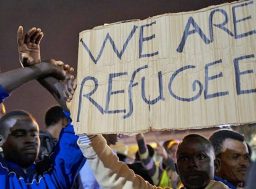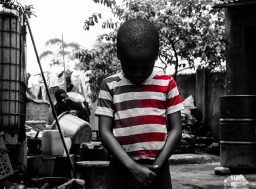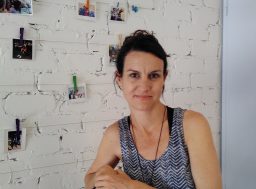
In the Knesset, there was a discussion session about the torture victims of the Sinai. NGOs, journalists, politicians, and doctors were invited. The five of us Orji, Osman, David, Tsege and myself set out to the Israeli Parliament.
Due to the heat of the last couple of days which affected us more than we thought it would, none of us is really that fit. Our driver Orji is pregnant and has been with us on an exhausting bus ride and the demonstration in Holot on the World Refugee Day afterwards. “My baby should know whom he had picked as his mum.” At least Orji’s car is air-conditioned. The one and a half hour drive passed really quickly. A reason for this are the things you see while looking out of the car window onto the city. Jerusalem combines biblical old things and 20th century modern things. Religion is present everywhere you look. In my opinion there should be more books dealing with the psychology of this city, but that’s a different topic. The Knesset which is rather small compared to the German Bundestag and which is located on a hill provides an impressive view on the Jerusalem’s hills. Everything is beautifully green and is in full bloom. What a difference compared to Tel Aviv! A light breeze up here makes the constant heat of the city much more bearable. The complex is very manageable – there is a main building and a few outbuildings. There are a lot of agents, which can be easily recognized by wearing earplugs. Everywhere you look you see cameras, so I guess that even on our way to the Knesset we were on “Big Brother’s” radar.
At the entrance of the building people queued up. Everyone who wants to enter the ground of the Knesset has to have their ID with them and must have announced their visit beforehand. First the bag search, afterwards through the detector, and then finally I get my day ticket which I always have to carry with me and have to l discharge it when I leave the Knesset. My personal Knesset agent – at least he seems like that – gives painstaking attention that I don’t get lost and he always tells me that his job is only finished when I discharge my ticket. Finally arrived at the assembly hall, I and my companions have to go to the toilette since our nervousness is slowly beginning to rise.
Shortly after, the Knesset member Michal Rozen introduces the discussion and welcomes all of us. At the beginning the movie documentation “Sound of Torture” by director Keren Shayo, who is also present, is shown. Osman can’t take it and leaves the hall. I follow him after two more minutes. Only after the documentation has ended, we’ll go in again. The old demons, Osman thought that had disappeared, returned. He knows the buildings in the film very well. He describes the room in which he and some others were detained to me. He remembers the smell, the screams, and the pain. He is really nervous, so I tell him to look at me and then I explain to him that he’s safe and that I am here for him. He nods but his face is totally sweaty. I ask him to go to the bathroom to wash his face with some cold water. He doesn’t really want to but he still goes. We can’t really imagine, what the torture victims in the Sinai went and still go through. Even if we tried, I think it wouldn’t work because we don’t have such a cruel imagination.
Only now I recognize that we are being watched. A Knesset agent follows Osman to the bathroom. I recognize that behind me there is an agent who watches me. He’s tall, seems to be very athletic, has dark hair and dark brown eyes. Opposite me stands a woman, she is rather thin and small.
15 Minutes passed since Osman went to go to the bathroom. I slowly start to worry. What if they detain him? Here in Israel, black Africans can be detained without cause and sent to jail for an undefined period of time. I have to stop thinking about such things, now. However, looking at all these security cameras I can’t stop asking myself that if Osman doesn’t come back, how far I would go to save him. I pull out my mobile phone to send a proof of life to my Israeli lawyer. Suddenly, “my” agent comes to me and says in a bossing tone that I should switch off my phone and that it is forbidden to use them in here. However, I knew that I saw some people earlier who were also using their mobile phones. That’s the reason why I even dared to pull out mine. I didn’t see a corresponding prohibition sign anywhere. I notice that I slowly start to boil with rage. I take a deep breath and hear myself admittedly a little provocative saying: “Does this prohibition of mobile phones apply to all visitors or only to those that are non-Israeli?” Or does it only apply to those that the state has its eye on, I ask myself in secret. In the meantime, Osman, and with him his agent, returned from the bathroom. In that moment, so many things buzz around my head most of all the security of Osman. The voice from within, however, tells me not to be scared in here. The agent looks me in the eyes quite a long time, at least it seems like that to me. Eventually, Osman ends this unpleasant situation by asking me if everything would be fine. I am glad that he is back and I give him a hug whereupon he smiles. My agent distances himself again and it feels like something has changed between us. I am only wondering whether it is for the better or the worse.
„God, please give me the strength not to lose my nerve and to make it through the day”, I sent up a quick payer. All of a sudden, coffee ladies show up at the end of the corridor and hand out tea and coffee for free. Osman takes the opportunity, goes to one of the ladies, and asks her for an extra strong coffee with a dash of milk – the coffee is for me. He is not doing well trying to cap the plastic cup. I recognize his agent coming closer and closer. I rush to him and hold the coffee cup so that it is easier for Osman to cap it with his hand which is damaged from the torture. From the corner of my eye I see the agent acting nervous and starring shocked at Osman’s hand. He seems to talk to somebody, at least his lips move. All at once, he disappears. I get some water for Osman, I doesn’t want anything else.
The film in the big hall has not come to an end yet. So Osman and I decide to take a look at the pictures in the corridor. Former Prime Minister Scharon, Natanjahu, Rabin at the Wailing Wall, pieces of Israel’s history. However, we don’t talk about Israel’s history, but rather about what we will perhaps be talking about in the plenary hall later. Osman doesn’t think that his situation and this of his people will get better here in Israel. It seems like the Israeli government hates black Africans. It hurts to see him like that and not being able to explain to him, where this supposed hate is coming from. It seems like no one in this government feels the obligation to seriously deal with the torture victims’ destinies. Instead, black Africans are made responsible for many problems here in Israel: unemployment, housing shortage, way to high living costs. The scapegoat for many of these problems is on rank one the non-Jewish black African. The PR, to make “Israel” seem to be the permanent victim in the world public, works perfectly! It is crazy how many topics don’t or just partially become public this way. Image is everything and everyone who dares to criticize something is dismissed as a betrayer or even as anti-Semite if the person is not from Israel. However, I don’t want to start a discussion about that at this point.
Suddenly, the door to the assembly hall opens and Tsege, who translates for the torture victims at ASSAF, comes out. She cries bitterly and so I take her in my arms. She is also tortured by memories and the pictures in her head. She may not be a Sinai torture victim herself but due to working almost exclusively with those victims the documentation also makes her feel low in a special way. Tsege receives therapeutic assistance at ASSAF too because descriptions of such torture don’t pass without a trace, even if you “only” have to translate them. At some point she calmed down. Finally, the documentation ended. In the small break afterwards, the waitresses are really busy. In the meantime, Osman’s agent came back. In a quiet moment he heads me off and asks me where Osman got his serious injuries from. I tell him a short version of Osman’s story. He only shakes his head, obviously words fail him.
After the break, we go for the real thing. Firstly, Michal Rozen speaks and again expresses her regrets and emphasizes that the Knesset has to find ways to help the victims. The EU Commission representatives Mr. Cohen and Mrs. Kaz assure that the Commission has not forgot those people. After that, the discussion round starts in which members of the likud Party show their dislike of black Africans. Doctors explain their difficulties in medical aid and NGOs like ASSAF and PHR describe their situation and strongly ask the government for help. Questions like, “Why are torture victims from Sinai in jail, although they urgently in need of medical treatment?” are not really answered. The current government obviously does not have a strong interest in helping those people. In contrary, they refuse almost every help and harass them until the voluntarily leave the country again, no matter how severe their injuries and traumas are.
Eventually, the head of the Gesher clinic rises to speak. The clinic is one of the only few exceptions from the general disinterest in the torture victims. After things have gone back and forth for a while, the government decided to help torture victims at the Gesher clinic. The first therapeutic center for torture victims or refugees and asylum seekers opened in February 2014. The clinic which is in the Florentin area in Tel Aviv, can treat up to 200 patients. Even if the waiting list got extremely long in a very short time, the clinic is a real blessing and a great relief for ASSAF and PHR. The government gave aid money to the United Nations High Commission for Refugees (UNHCR) and this in turn arranged that the Israeli ministry of health has the supervision of the therapy center. Right-wing radicals and extremists were really mad that there is help for the “black scum” (quote of interior minister Gideon Sa’ar in one of his official speeches). With the help of the therapy center it is much easier for medical specialists, psychiatrists, and psychologists to record all torture cases. To date, however, it is prohibited for specialist staff of the clinic to use the word “torture” in their reports. The reason: If a torture victim is reported as one than the Israeli government has to pay for those people, which at the moment is difficult to imagine.
Now I have to talk to the members of parliament and answer their questions. I had to smile a little bit as one of them asks me where I think room for improvement is. I emphasize that the Gesher clinic is of great help for the torture victims, NGOs like ASSAF and PHR, however, are at least as important as this clinic. This is why it is necessary that the Israeli government takes actions to support these NGOs.
A little later, a member oft he Likud Party reports that Israel is negotiating with Jordan that Jordanian workers are allowed to come to Israel. Someone asks why and what for they want to do this and she replied that Jordanian workers are cheaper than black Africans and they still have a good life in Israel. This is why she thinks that it is a logical step to replace black Africans with Jordanian workers. Now a tumultuous chaos arises – politics at its best“! Osman is only looks at me and shakes his head. He says that many of them have high debts because they have to pay the ransom back to their families and friends. Due to physical and mental problems resulting from the torture, many of them cannot work anymore. Who will then pay the debts? I try to imagine how hopeless this situation for many of them might be and I take a deep breath.
Suddenly, someone asks me why I am here at all. Germans have caused a great disaster with the Holocaust and are not wanted here. I look at her and I say that the Holocaust was horrible but it belongs to the past and has nothing to do with the present situation. I ask her if she is interested in a future where all religions in this country can live together in peace. I do not wait for her reply and continue “Well, then let’s talk about the phenomenon called apartheid that is happening today and find a solution to it.“ It is important to know what happened in the past to learn from it. Yet, I think it is fatal to use the past to disregard failures that are taking place today. I ask myself why Israel receives so much money from other governments, although the country has a very inhuman policy. When will the world realize this? I will probably ask myself this question over and over again. After a while, all of us are calm again. Michal Rozen thanks all participants for their interest and willingness to discuss.
After the session, the NGO’s representatives try to talk to the members of parliament and we exchange business cards. Osman and I are leaving the assembly room and I think this is a good idea to calm down after such a nerve-racking discussion. As I enter the assembly room again, a few Doctors and the head of the Gesher clinic approached me. They say that they would be pleased to see me in the clinic in the next days. We exchange /phone numbers and e-mail-addresses. I think about writing an e-mail to the head of the therapy center for torture victims in Cologne and give him the contacts of the head of the Gesher clinic. Both work in the same field and I am sure they could benefit from each other.
I am not good at small talk and especially not after such a difficult discussion with such difficult topics. I decide to go to the restrooms and refresh myself with some cold water because the air-conditioning did not help. As I come back I see my agent standing close to the restrooms. I shake my head and approach him. Now I reached him and put my arm around his shoulder and whisper“I did not know that I am a very important person and that you are worried about me just because I am going to the restrooms!“ He had to smile. Meanwhile, David und Tsege joined Osman. They are laughing, how nice. As we are about to leave, Michal and her assistant approach me and we have a brief conversation. We like each other immediately and arrange an appointment with her and other members of Knesset to talk about some topics in detail.
Back in Tel Aviv, Osman and I have something to eat in the late afternoon. I realize that I need some time for myself to think about the day and have a rest, although ASSAF is waiting for Osman and me. So I decide to go to the beach. When I am at the sea, it is easier for me to calm down. I will switch my mobile phone off for a while. While I say good-bye to Osman he whispers: “Maybe they did not know about you and Desert Rose in Knesset yesterday, but from this day they will remember you as someone who honestly says what she thinks.” This is a nice compliment from someone who escaped from hell and now has the courage to meet the members of Knesset and represent all torture victims. He has my full respect.
Author: Rahel Woldemichael
Translation: Nicole Freibott/ Diana Köth/ Melanie Martin







Follow us